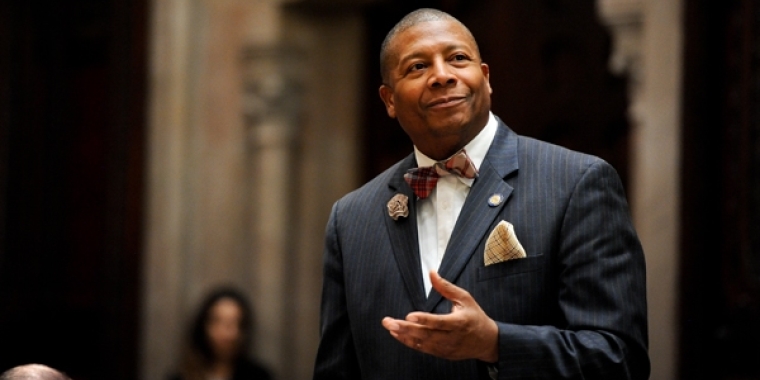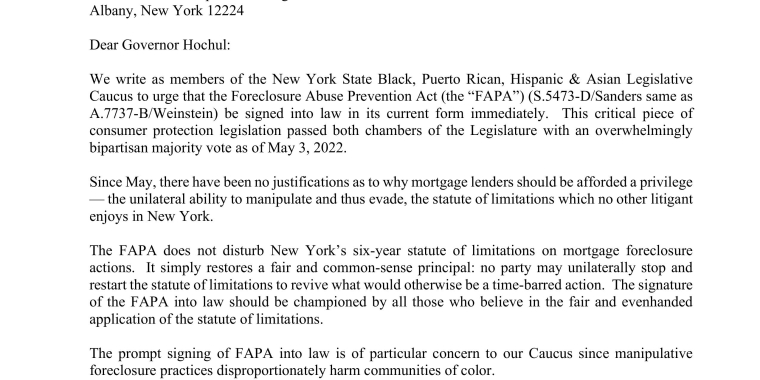
Sanders Touts New York State Budget As Most Progressive In Years
April 1, 2016

From Thursday afternoon to Friday morning, Senator James Sanders, Jr. (D-Rochdale Village) joined his colleagues in Albany in passing the state’s budget for the upcoming fiscal year.
Most notably, the budget agreement includes a phased in statewide minimum wage increase from $9 to $15 per hour. In New York City, it will reach the latter amount by the end of 2018. In addition, tipped restaurant workers will be required to receive two thirds the minimum wage. Ensuring no worker is left behind is a cause the senator has championed.
“I’m happy to report to my constituents that the Fight for $15 has been won,” Sanders said. “Though we can and should do more, this gives us a floor upon which we can build.”
New York became the second state in the nation to approve a $15 minimum wage, following California’s doing so mere hours earlier. Since New York’s increase will be fully implemented before that of California, it will become the first state to reach such a threshold.
The cost of the minimum wage increase is to be offset by programs such as incremental tax credits for hiring farm employees, eventually reaching $600 per employee in 2021, and the Summer Youth Employment Program, funded to the tune of $31 million. These initiatives are designed to ensure jobs are not lost as employers are asked to pay higher wages.
The budget also includes paid family leave, another major accomplishment. This will allow New Yorkers to take up to 12 weeks off to care for their families and bond with newborn children while being paid two thirds of their salary (or the state’s average personal income, whichever is greater). The program will be funded by workers through a payroll deduction of approximately one dollar per week. It should be noted, however, that caring for siblings was removed from the scope of paid family leave during negotiations.
Personal income tax reductions are included in the budget to help middle class individuals and families. When fully effective, taxes will be reduced by $1 billion, with rates for filers reduced from 6.45% to 5.5%. The controversial Education Tax Credit, which would arguably steer money from public schools, was not created.
Aid to education was increased by $1.4 billion to a total of $24.8 billion, a 6.5% increase from last year. This includes a $499 million increase to Foundation Aid, $75 million added for community schools and $4 million more for public libraries, bringing the total to $95.6 million.
The Doctors Across New York program was modified to require applicants to commit to practice in an underserved area for three years in exchange for $40,000 a year in loan repayment. Previously, it was five years for $30,000 per year.
Proposed cost saving measures that would have hurt working families, such as changes to the Workers Compensation system, were excluded from the budget. Plans to shift Medicaid and CUNY costs to New York City were likewise defeated. State tuition for CUNY and SUNY will be frozen for the coming year, giving students the peace of mind they will not be further burdened by ever increasing college costs.
On the subject of gambling revenues, an agreement was reached where Resorts World at Aqueduct will be authorized to add more video lottery terminals to the ones it already has, and make payments to Nassau County Off-Track Betting, subject to approval by the Gaming Commission. This will allow compliance with previously passed legislation without constructing a new gambling facility at a location such as Belmont.
On the negative side, the budget omits proposed ethics reforms such as banning or limiting outside income for legislators after a year during which the public’s trust in elected officials justifiably dwindled. It fails to close the LLC Loophole, which allows bypassing the contribution limit to political campaigns and maintaining an unlevel playing field.
Big ideas like the Dream Act, granting financial aid to undocumented students, and the New York Promise Program, providing free community college tuition, did not make this year’s budget.
During deliberations, Senator Sanders also expressed concerns that the MWBE system may be weakened. Under existing law, New York has a goal for 30% of state contracts to be awarded to minority and women owned businesses. However, since the budget prioritizes other factors, it may undermine MWBE growth.
“When you start coming in with other language,” Sanders warned, “that says MWBE participation is still required ‘to the extent practicable,’ you’re contradicting the [law].”
This year’s state budget totals $147 billion and is within the 2 percent spending growth cap imposed by the governor.
“All in all, despite some concerns, this is likely the most progressive budget the people of this state have seen in twenty years,” concluded Sanders.
.
Share this Article or Press Release
Newsroom
Go to Newsroom


